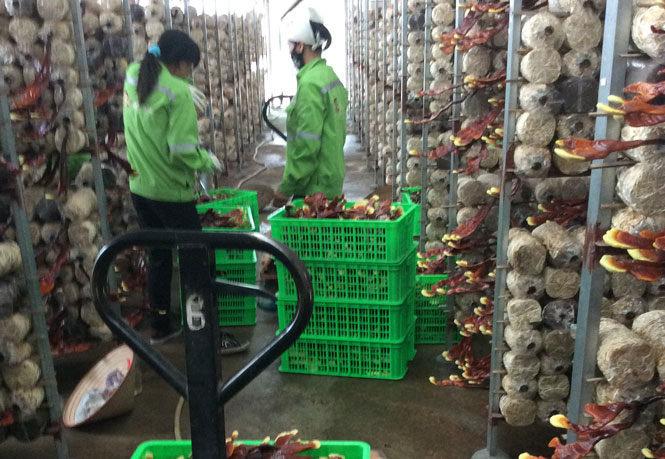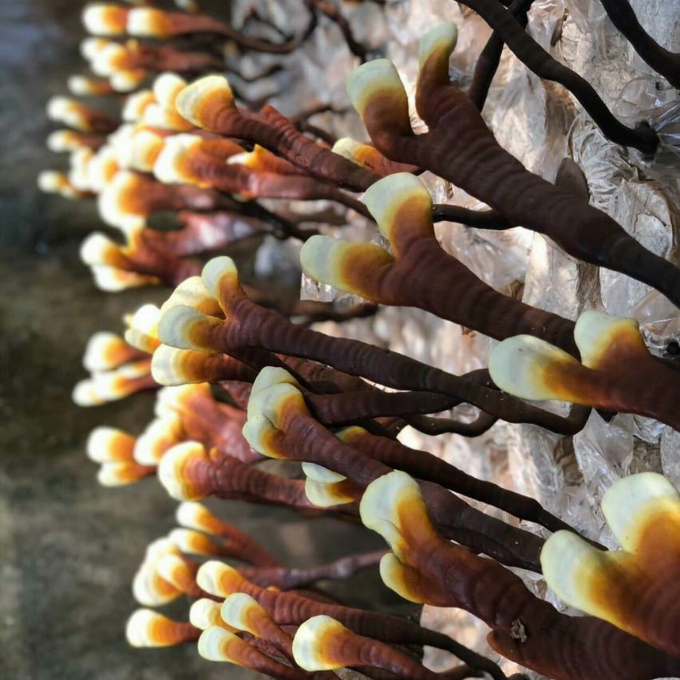May 31, 2025 | 16:17 GMT +7
May 31, 2025 | 16:17 GMT +7
Hotline: 0913.378.918
May 31, 2025 | 16:17 GMT +7
Hotline: 0913.378.918
In recent years, the Thai Nguyen agricultural industry has made considerable strides and has established itself as the economy's pillar foundation. Programs, schemes, and projects aimed at assisting agricultural productivity and farmers have dramatically altered the tea land's landscape. Agriculture is expanding in terms of both quantity and quality.
Previously, tea used to be the sole export product, but the situation now is changing since there are several major force plants such as fungus, cinnamon, and forest wood, as well as numerous areas of livestock production such as cattle and poultry farming, vermicelli, and noodles manufacturing are now also attaching to export activities. That accomplishment is largely due to the contributions of science and technology.

100% of Thai Nguyen's OCOP products are stamped with traceability codes and supported on the e-commerce platform. Photo: Dong Van Thuong.
Mr. Pham Van Sy, Director of the Thai Nguyen Provincial Department of Agriculture and Rural Development, stated that, as a result of the positive effect of science and technology, several high-tech models have been implemented in production and processing. The models have aided in the positive transformation of agricultural practices, primarily via the adoption of spray irrigation, drip irrigation, economical irrigation, greenhouses, net houses with semi-automatic control systems, vacuum packing lines, gas-fired corrugated iron, and cold storage.
It has brought high economic efficiency and is more fitted to the local conditions. Agro-forestry-fisheries production value was estimated to be worth about VND 14,600 billion in 2021, an increase of 4.18 percent over the previous year. The value of products collected on 1 ha of agricultural land reached nearly VND 118 million, exceeding the plan. Thai Nguyen province has 53 agricultural products that have been evaluated and awarded OCOP ranking, of which 07 are eligible for the national 5-star OCOP competition. Agriculture - rural regions have made a significant contribution to Thai Nguyen province's overall economic growth.
Despite several positive transformations, Thai Nguyen agricultural products have yet to establish a foothold on the global market. Exports of commodities remain fragmented, with a low export value.
While farmers and businesses performed well in terms of production and processing, they encountered several obstacles when it came to product promotion. Mr. Do Xuan Hoa, Director of the Thai Nguyen provincial Department of Information and Communication, stated that agriculture is a top priority in the province's 2021-2025 Digital Transformation Program.
Relevant units have organized several initiatives to boost agriculture production through the e-commerce platform, including web development assistance, domain registration, and digital skills training for agricultural production families and small and medium-sized businesses. Specifically, 100% of OCOP products were pushed to the e-commerce trade floor.

Thai Nguyen has almost 100,000 agriculture farming households that have been instructed by Postmart nad Vo so to create pavilions on an e-platform with around 1,500 products.
Farmers acquire digital skills, receive training, develop new habits, and do business on the e-platform and in the digital space. The agriculture industry has contributed hundreds of thousands of stamps to trace agricultural production and business establishments in the province using QR Codes.
Mr. Duong Son Ha, Deputy Director of the Thai Nguyen provincial Department of Agriculture and Rural Development, stated that in addition to promoting high-tech and smart agricultural production development, Thai Nguyen seeks to administer and manage agriculture through the use of digital technology, establishing an industry-wide data system for land, plants, and livestock.
Simultaneously, using digital technology to automate production and business processes, manage and monitor the origins of agricultural products and product supply chains, develop growing area codes, and develop e-commerce in agricultural products, with a special focus on province-specific products and OCOP products...These synchronous solutions will open up opportunities for Thai Nguyen agricultural products to be exported with an increasing value and proportion.
Digital transformation is a global trend that Vietnam is also promoting as part of its industrial revolution 4.0. In agriculture, digital transformation helps connect millions of farming households with processors, traders, and suppliers.
Digital transformation also opens up new consumption channels to help narrow the gap between producers and consumers, ensuring transparency of commercial transactions and thus creating a healthy business environment for agricultural products.
The agriculture sector's long-term digital transformation must begin with farmers and be built on a digital and data basis. All policies must be oriented around farmers, rural areas, businesses, and cooperatives. Farmers, rural regions, companies, and cooperatives, on the other hand, must all engage in the digital transformation process. Simultaneously, the leader must possess innovative thinking, a strategic vision, an appropriate method of doing things, and a strong commitment to the reality, conditions, and circumstances of Vietnamese agriculture in order to achieve high efficiency, widespread, and benefit for the participants.
Translated by Linh Linh

(VAN) Seafood by-products are opening a new path, combining green growth and technological innovation to enhance the industry's value.

(VAN) Mr. Nguyen Thanh Cong, Vice Chairman of the Son La Provincial People's Committee, reflects on Son La’s journey from barren hills to fruitful orchards after a decade of hard work.

(VAN) FAO’s Director-General addresses the 5th Baghdad International Water Conference.
/2025/05/26/1716-4-nongnghiep-191706.jpg)
(VAN) Chain linkages, technological innovation, and raw material zoning are three strategic pillars for the coconut industry to strongly develop and elevate its position on the global agricultural map.
![Advanced mariculture – an inevitable trend: [4] Accompanied by scientists](https://t.ex-cdn.com/nongnghiepmoitruong.vn/608w/files/sohk/2025/05/13/1941-pgsts-vo-van-nha-140958_717.jpg)
(VAN) According to Assoc. Prof. Dr. Vo Van Nha, Director of the RIA III, the development of advanced offshore mariculture is no longer an option but an essential path for Vietnam’s fisheries sector.

(VAN) Vietnam is intensifying the development of mollusk farming areas that meet international standards, aiming for sustainable growth and enhancing its export position in the global seafood market.
![Advanced mariculture – an inevitable trend: [3] Policy-driven momentum](https://t.ex-cdn.com/nongnghiepmoitruong.vn/608w/files/doanhtq/2025/05/21/0104-0616-0348-nuoi-bien-170339_789.jpg)
(VAN) To ensure the success of offshore mariculture that uses advanced technologies, it is essential to establish supportive policies that inspire both individuals and enterprises to invest with confidence.